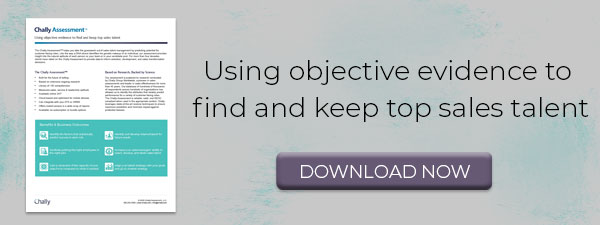Business Acumen and the Sales Profession
The Chally Assessment measures aptitude for 135 sales, service, and leadership competencies. One of the arenas we hear the most interest in is around Business Acumen. In this post, I take a look at what business acumen is and how it plays out in real life sales situations.
During a recent client engagement, I heard a phrase from a sales VP that I had not heard in a while. “Spray and Pray” is a term often used among military infantry but also holds a special place among salespeople who must generate leads and close business. It is synonymous with the issues of mass activity but little to no productivity. The challenge with advertising, buying emails lead-gen lists, or engaging anyone and everyone as a prospect is the difficulty of measuring which component or components are actually useful in leading to business. It is hard to quantify. It is hard to measure impact. And dependent on the type of sales professionals a company has it ultimately leads to a business development strategy that any business is considered good business. Coupling this fact with the misconception that selling is all about relationships (and nothing else) leads to staffing a sales organization where sales reps think they can “show up, throw up and leave” and take the business home with them.
For tips on how to build a world class sales force read our blog, “Business Lessons from Moneyball.”
Talking and not delivering is not a successful sales strategy. Engaging customers in relationships to the extent sales reps “do the donut drop” does not result in business at all. This does not mean that relationships are unimportant, but relationships should be the bi-product of engaging a customer and adding value to their business – not just talking to anyone and everyone and hoping something lands. It is about approaching the right customer and having the knowledge to help that customer’s business grow and improve. This concept of adding value to customers’ business is often referred to as “business acumen” among many sales executives with whom I have spoken. What this basically means is that the sales rep’s knowledge and expertise become a driver of the prospect’s business practice. There are many components to business acumen but a few of the primary components are showcased below using the Chally Assessment scales:
- Builds Business Acumen:
Achieves and maintains professional proficiency; understands technical and business standards. - Maintains and Shares Market Awareness:
Updates market knowledge to be of assistance to customers who may not have time or resources to manage monitoring market trends. - Makes Well Researched Decisions:
Makes thorough, well-researched decisions that are compatible with overall goals and priorities in a corporate setting. - Makes Profitable and Pragmatic Recommendations:
Leverage products or services to make recommendations that are cost-effective and beneficial for clients’ operations.
I kept the focus on these, because when I review all the executive, manager, and incumbent engagements I have conducted over many years, the themes seem to come back to: (a) does the rep understand MY business, (b) does the rep understand how my business fits into the business world, (c) does the rep understand what he or she is talking about and can they bring the right level of problem solving to help my business and (d) can the rep understand that business is not an academic exercise but a real issue of making and saving money. The above list is far from comprehensive, but the reality is that the “right” sales professional and the right skills still vacillate a bit. That said, you can bet that a rep who knows nothing of business, can’t make decisions and has no idea how much something costs is going to have a brief and unproductive sales career.



